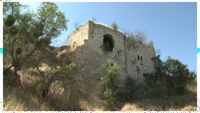Remembering Is Now 64 Years Old

'There is the beginning of my life. My father would call for prayer, ‘Allahu Akbar’,' says 72-year old Yacoub Odeh, pointing to a collapsed house perched high on the hill. 'The whole village would hear him.' Odeh was then eight years old: 'I’m the son of yesterday.'
Sixty-four years on, Lifta conjures up the Naqba — the 'great catastrophe' that befell the Palestinian people during the war that led to Israel’s inception. Hundreds of thousands fled their homes or were forcibly expelled by the nascent state’s forces and, like Odeh, became refugees.
Lifta languishes in ruins, strewn on the seam between Israel’s west and Israeli-occupied east Jerusalem. For many Palestinians, the village symbolises the memory of lost land and national destitution. There, Odeh revisits freedom and peace.
Locked behind the safe walls of his childhood, he fondly caresses the living stones. 'Our door faced the morning sun.' Many houses still stand up majestically; all that remains of Odeh’s home is wild fennel and half-buried walls.
Prior to Israel’s independence war, Lifta was a cluster of 500 homes, a wealthy community of 3,000 living in harmony. 'The water spring, the gardens, the fields, the mosque, the olive press — such was my world.' Odeh invokes the idyllic echo of 'people dancing and singing.'
'How not be haunted by that fateful day of February 1948? We were under siege. I’d hear the Zionist gangs shooting,' he remembers.
When over a hundred Palestinians were murdered by Jewish militiamen during an assault on the nearby village Deir Yassin, the horror set off a wave of panic. 'Suddenly, my father carried both my sister and brother,' Odeh recalls. 'We crossed the valley, climbed the mountain; we took only what’s in our minds, our memory.'
Within weeks, not a soul remained in the 2,000-year-old village. 'In one moment we became refugees.' Within one year, the majority still living on the land that became Israel became a minority denied of the right to the land.
Large holes were pierced in ceilings and floors to render the abandoned village inhospitable. The Odehs never returned to live; no one did. But the Liftawis never turned their back on their dream of coming back home.
Odeh brushes the rosy limestone. Being a refugee is often to live in exile out of one’s soul, but not for him. 'I’ll never forget nor forgive until I regain my right to be free in Lifta, in Palestine.'
Year after year on 'Naqba Day' (May 15), Palestinians demonstrate their aspiration to what they insist is their 'undeniable right of return'. Refugees hold up symbols of keys of long-lost homes.
According to the United Nations Relief and Works Agency (UNWRA), there are now more than four million registered refugees scattered across the Middle East, in protracted limbo.
To most Israelis, the historical demand is deemed an 'existential threat'. Compliance to the 'right of return' would destroy their state from within, they counter, for the absorption of millions of Palestinians would irrevocably alter its Jewish majority.
Odeh would like to reassure them. 'There’s enough place for Muslims, Jews, and Christians. We must live together — like our grandfathers lived together.' Some hope the spectre of such sentimental one-state solution will eventually prompt Israel to negotiate a political two-state solution, and Palestine to absorb the bulk of the refugees.
Odeh personifies the forlorn history of his people. Soon after their forced displacement, his father died 'of a broken heart'. The family resettled in east Jerusalem.
He worked as a film librarian in Kuwait, studied law in Beirut, became a militant for the Popular Front for the Liberation of Palestine. He was 27 when Israel conquered east Jerusalem.
Back home, he resisted the occupation. Sentenced in an Israeli court to three consecutive life terms for 'terrorist activities', in 1985, he was liberated in a prisoners’ exchange.
Now a human rights activist, he’s a self-appointed custodian of the village memory.
Heaven for homeless hippies by choice, haven for soldiers on furlough in search for serenity, Lifta is one of the last empty villages standing after the 1948 war.
Five hundred such Palestinian villages were then destroyed. What usually remain are terraces, mildewed stones and weeds marking forsaken graveyards, aging fig trees grown wild, prickly pears and wailing walls.
Following Odeh in the footstep of his roots to the doorstep of a roofless memory, the visitor won’t escape the utter beauty, the dignity that the place exudes; the scars that nature has inflicted with time; the infringements of the modern city; the nostalgia of paradise lost.
Odeh sighs, 'I remember how I’d go catching my mother’s dress...'
In 1959, the coveted piece of real estate was decreed a natural reserve. Wanting to emulate the preserved village of Ein Hod now home to an Israeli artistic community, Israel Lands Authority urban planners tried to develop Lifta into a luxury neighbourhood.
But former dwellers backed by Israeli human rights organisations appealed to the District Court. In February, the plan was shelved — for now.
'We want to preserve Lifta as is, to renovate it as historical museum open for all,' insists Odeh. 'Why do they want to destroy this cultural heritage — to build villas? Lifta must be kept as eyewitness.'
While Israelis treat Palestinian memory as a security hazard, Palestinians mourn their loss; glorify their memory; yearn to resuscitate a utopian past.
'Palestinians, Christians, Jews, Muslims, it’s not important. What matters is to put an end to the occupation, create one democratic state,' Odeh says. And, in a murmur: 'History won’t forever go in the wrong direction.'
History sometimes stutters, but Israelis won’t allow it to repeat itself.
Meanwhile, Odeh returns to his home, a few kilometres away from 'home'.
© Inter Press Service (2012) — All Rights ReservedOriginal source: Inter Press Service
 Global Issues
Global Issues